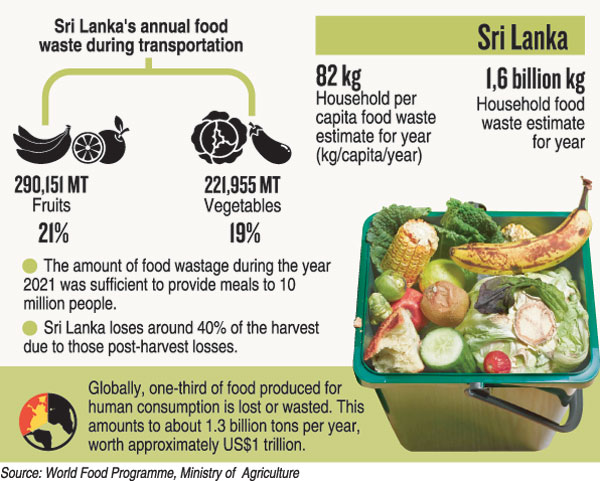News
Post-harvest losses: Fresh leadership and a new initiative
View(s):By Malaka Rodrigo
Today, September 29th, marks the International Day of Awareness on Food Loss and Waste. The Sunday Times delves into the promises made by the newly elected president to tackle this issue, alongside a promising new initiative.
In the fertile lands of Nuwara Eliya, farmers harvest cabbages the size of an average jackfruit. However, by the time they are ready for consumption, they shrink to the size of a breadfruit, as several outer leaves become rotten or damaged and must be removed. In Sri Lanka, approximately 38% of fruits and vegetables are lost post-harvest.

Around 38% of fruits and vegetables are lost post-harvest Pix by Eshan Fernando
During his campaign, the newly elected president, Anura Kumara Dissanayake, addressed this issue, promising, “If I come to power, I will take action to reduce this post harvest loss which impacts both farmers and consumers”
Last Sunday, Sri Lankans chose Mr. Dissanayake as their president. Interestingly, exactly a week into his presidency, the first globally recognised day under his leadership is the International Day of Awareness on Food Loss and Waste Reduction, perfectly aligning with a key campaign promise.
This international day, designated by the United Nations in 2019, highlights the urgent need to tackle the vast quantities of food lost and wasted globally.
Sri Lanka already has a dedicated institution for this cause—the National Institute of Post Harvest Management (NIPHM)—which operates under the Ministry of Agriculture to improve post-harvest technologies. While acknowledging NIPHM’s efforts, President Dissanayake emphasised the need for these technologies to be implemented at the grassroots level to effectively reduce losses.
The largest loss in Sri Lanka occurs during transportation. According to the Ministry of Agriculture, approximately 221,955 metric tons of vegetables and 290,151 metric tons of fruits are wasted annually during transport due to improper handling. This equates to 19% of vegetables and 21% of fruits being lost each year.
President Dissanayake stressed the importance of packaging in reducing these losses, noting that in developed countries, packaging is a standalone industry. “Farmers’ associations or private investments could handle packaging in agriculture sector, also creating new jobs in the process,” he said during his campaign.
He also pointed out the critical need for increased storage facilities. “Governments have not prioritized setting up enough storage facilities for vegetables and fruits. Proper storage allows surplus harvests to be saved for future use, stabilising prices and benefiting both farmers and consumers,” he added.
Now, with the presidency in his hands, Dissanayake has the opportunity to turn his campaign promises into action, benefiting both consumers and farmers alike.
At the same time, an ambitious initiative known as the CIRCULAR Project, led by the Food and Agriculture Organization (FAO), is set to launch in Sri Lanka with the support from the European Union (EU). The project aims to address food loss and waste using a circular economy approach, which emphasises reusing, recycling, and optimising resources across the food supply chain.

The project will be implemented in Colombo, Nuwara Eliya, and Galle, involving data-driven assessments of food loss and waste, states Carmen Moreno, Ambassador of the European Union to Sri Lanka, and Vimlendra Sharan, FAO Representative in Sri Lanka. It will also support the adoption of digital tools to help stakeholders along the food chain identify and address the root causes of waste.
Additionally, the project will contribute to the recovery and reuse of food waste, improving food access for vulnerable communities and reducing the environmental footprint of the food supply chain. By tackling food loss and waste, it aims to enhance food security, improve rural livelihoods, and support sustainable agricultural growth, Mr. Sharan noted.
While many ambitious projects have been initiated in Sri Lanka, they often falter once funding dries up. However, with a fresh president who has promised a new direction for the country, this FAO-backed initiative presents a unique opportunity. The president’s vision for reducing post-harvest losses seems aligns perfectly with the CIRCULAR Project.
This collaboration could be the perfect platform for President Dissanayake to demonstrate how to use the science and technology to lead Sri Lanka toward a more sustainable future.
The best way to say that you found the home of your dreams is by finding it on Hitad.lk. We have listings for apartments for sale or rent in Sri Lanka, no matter what locale you're looking for! Whether you live in Colombo, Galle, Kandy, Matara, Jaffna and more - we've got them all!

